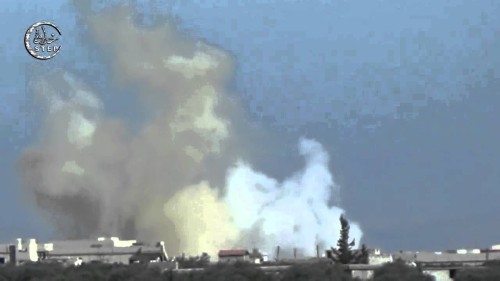LATEST
- Syrian Military Claim Recapture of Handarat Village, North of Aleppo
- Regime Claims Downing of Unmanned Foreign Drone; US Confirms Loss of Contact With Aircraft
- Report: Regime General, Spying for Opposition, Led to Important Rebel Victory South of Damascus in October
- Amnesty: Deadly Regime Airstrike on Raqqa Killed More than 100 Civilians — “Every Indication of Being War Crimes”
WEDNESDAY FEATURE
A Regime “Torture Camp” Only 500 Meters from Assad’s Presidential Palace?
Amnesty International has said Monday’s chlorine gas attack on a town in northwest Syria is a “war crime” by the Assad regime.
Witnesses and medical staff said that scores of people in Sarmin were killed and wounded by “poisonous gases” after four barrel bombs were dropped by regime helicopters. Videos and doctors testified to victims, including infants and children, suffering from breathing difficulties, vomiting, reddened eyes, and drooling from the mouth.
The witnesses confirmed claims that six members of a family, including three children younger than three years of age, died.
See Syria Video Feature: Victims of Monday’s Chlorine Attack in Idlib Province
Syria Daily, March 17: Reports — Chlorine Bombs Kill and Wound Scores in Idlib Province
A local civil defense worker said:
The smell was horrible. We evacuated people. We were told that a family lives in the basement. Three of us went down the stairs. I took one breath and then when I took the second my throat burned, my eyes started burning. We didn’t have masks. We don’t have special clothes.
I couldn’t proceed. I was holding my breath but couldn’t hold it further.
I saw a woman on the stairs. She was blue and was not breathing. We evacuated her and a minute later the next team went in and evacuated the other family. They were wearing masks – that is why they were able to go all the way down. They evacuated the father, mother and three babies. They all died.
“These horrific attacks that resulted in civilians, including small children, suffering excruciating deaths, are yet more evidence that the Syrian government forces are committing war crimes with impunity,” said Philip Luther, Amnesty’s Middle East and North Africa Programme Director. “The situation in Syria must be referred to the International Criminal Court as a matter of urgency.”
Syrian Military Claim Recapture of Handarat Village, North of Aleppo
The Syrian military claims that it has retaken Handarat village, near a key highway north of Aleppo.
The regime had long held Handarat, but lost it last week to a rebel offensive.
See Syria Daily, March 11: Rebel Victories North of Aleppo
The opposition continues to occupy Handarat camp, near the essential road link to rebel-held areas of east Aleppo; however, the Syrian military claims that it “targeted terrorist organizations’ dens and movements…leaving many terrorists dead and their hideouts, weapons and ammunition destroyed” in the area.
The Assad regime has tried for months to cut the route to Aleppo, but lost ground — and hundreds of casualties and captured — in a failed offensive in February.
Regime Claims Downing of Unmanned Foreign Drone; US Confirms Loss of Contact With Aircraft
The Syrian military said on Tuesday that it shot down a foreign drone in Latakia Province in western Syria.
US officials have said they lost contact with an MQ-1 Predator surveillance aircraft but said that it is unclear if it was downed. The Pentagon said it was looking into the incident.
Syrian State TV coverage:
Report: Regime General, Spying for Opposition, Led to Important Rebel Victory South of Damascus in October
The National claims in an exclusive that a Syrian general, acting as an agent-in-place for the opposition, led to an important rebel victory in October at Tal Harra, an electronic intelligence station 50 km (31 miles) south of Damascus.
Reporters Phil Sands and Suha Maayeh add that the defeat “sent President Bashar Al Assad’s mukhabarat, or secret police, on a hunt for the source of the leaks and resulted in the killing of dozens of military personnel wrongly accused of treason”.
The key to the victory was General Mahmoud Abu Araj, the commander of the the 121st Mechanised Brigade of the army’s 7th Division, which guarded the station intercepted Israeli communications as well as monitoring rebels.
Rather than defecting, Abu Araj used his post to undermine regime defences, contacting the rebels months before the attack. Rebel sources say he smuggled out detailed plans of defensive positions, force strength, military orders, code words and information about Iranian military reinforcements. He deployed his forces to make them more vulnerable to a rebel assault.
To cover his activity, Abu Araj had the rebels stage a fake ambush on his convoy east of Tal Al Harra. A rebel faction boasted that it had killed the general in combat, posting a copy of his ID card as proof.
In fact, the general crossed the Jordanian border on October 15. However, a month later, Abu Araj reportedly died from a terminal heart defect, returning to Syria just before he passed away.
Still, the effects of his espionage continued, according to a rebel commander: “We believe as many as 56 of its own officers were accused of treason in the months after Tal Al Harra, and executed, not all at once, but over time.”
Amnesty: Deadly Regime Airstrike on Raqqa Killed More than 100 Civilians — “Every Indication of Being War Crimes”
November 2014 attacks by regime warplanes on Raqqa, the center of Islamic State power in northern Syria, killed more than 100 civilians and has “every indication of being war crimes”, according to Amnesty International.
The organization said the “ruthless air strikes” between November 11 and 29 killed 115 civilians, including 14 children, with non-military targets including a mosque, a transport hub, and a busy market. It added that there was no sign that the assault aimed at positions of Islamic State fighters.

